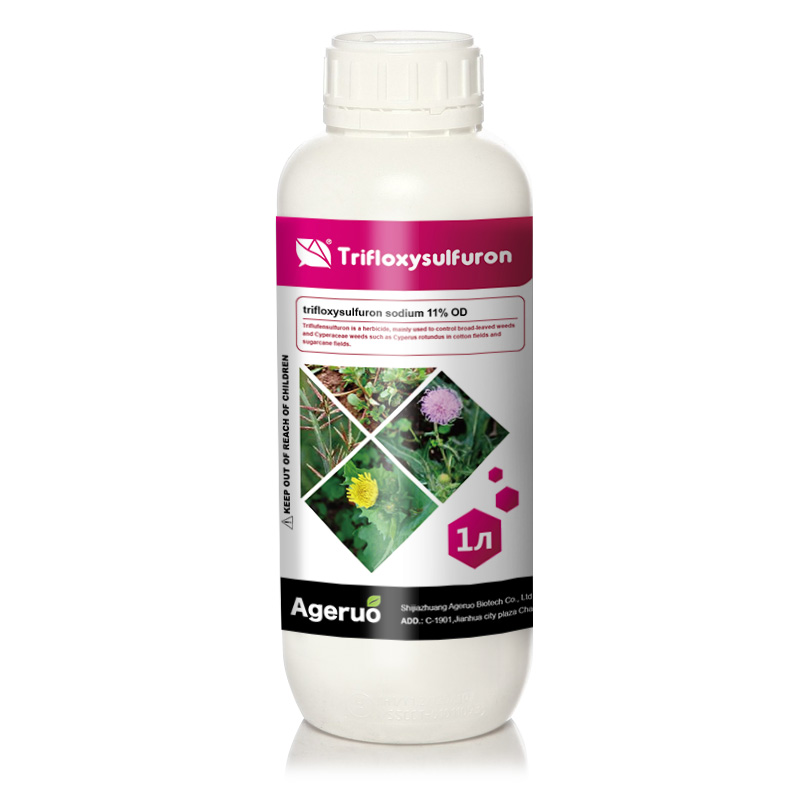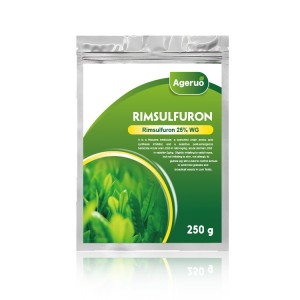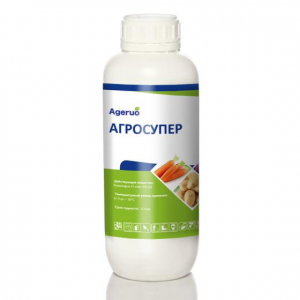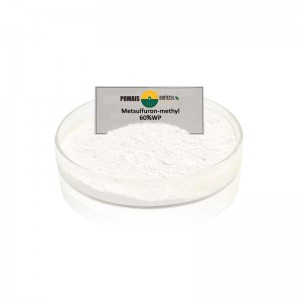Products
POMAIS Herbicide Trifloxysulfuron 11% OD
Trifloxysulfuron
| Active ingredients | Trifloxysulfuron |
| CAS Number | 145099-21-4 |
| Molecular Formula | C14H14F3N5O6S |
| Classification | Herbicide |
| Brand Name | POMAIS |
| Shelf life | 2 Years |
| Purity | 11% OD |
| State | Oil based |
| Label | Customized |
Trifloxysulfuron is a sulfonylurea herbicide that acts as an ALS (acetolactate synthase) inhibitor, disrupting the amino acid synthesis pathway in target weeds. It is highly effective on sedges, grassy weeds like crabgrass, and various broadleaf species, making it ideal for selective weed control in warm-season turf systems.
1. Advanced Systemic Action
After foliar or root uptake, Trifloxysulfuron moves upward and downward within the plant’s vascular system. It:
-
Inhibits cell division and protein synthesis
-
Stops weed growth within hours to days
-
Causes chlorosis, stunting, and eventual complete weed death within 2–4 weeks
This systemic effect ensures deep, root-level kill and minimizes weed regrowth.
2. Selectivity for Warm-Season Lawns
Trifloxysulfuron is safe for:
-
Bermudagrass
-
Zoysiagrass
-
Other warm-season turf varieties
It controls target weeds without harming desirable turfgrass, making it an excellent tool for:
-
Golf courses
-
Sports fields
-
Residential and commercial lawns
3. Broad-Spectrum Weed Control
Controls both:
-
Grassy weeds: crabgrass, goosegrass, signalgrass
-
Sedges: yellow nutsedge, purple nutsedge, Cyperus iria
-
Broadleaf weeds: spurge, clover, chickweed, plantain
Its ability to suppress mixed weed populations reduces the need for multiple herbicides.
4. Rainfast and Long-Lasting
-
Rainfast in as little as 4 hours
-
One application can last several weeks, reducing frequency of treatment
-
Compatible with tank mixes (verify local label guidelines)
Trifloxysulfuron offers professional-grade control, turf safety, and convenience—making it a high-demand product for turf care distributors and service providers.
Formulation and Usage Recommendations
POMAIS Trifloxysulfuron 11% OD is delivered as an oil dispersion (OD) formulation, which enhances:
-
Leaf surface coverage
-
Rainfastness
-
Absorption into waxy-leafed weeds like sedges
The formulation is ideal for professional turfgrass applications, particularly in warm-season lawns where selectivity and residual control are essential.
1. Product Specification
-
Active Ingredient: Trifloxysulfuron-sodium
-
Formulation Type: 11% OD (Oil Dispersion)
-
Appearance: Homogeneous, stable oil-based liquid
-
Mode of Entry: Absorbed by leaves and roots, translocated throughout the plant
2. Recommended Crops and Application Scenarios
| Crop | Target Weeds | Dosage | Application Method |
|---|---|---|---|
| Warm-season turfgrass | Crabgrass, goosegrass, foxtail | 300–450 ml/ha | Foliar spray |
| Warm-season turfgrass | Sedges (Cyperus spp.), broadleaves | 300–450 ml/ha | Foliar spray |
-
Spray volume: 200–300 L water/ha
-
Best applied to actively growing weeds, at 2–6 leaf stage for grasses or early vegetative stage for broadleaves/sedges
3. Application Timing and Frequency
-
Apply when weeds are young and actively growing
-
Avoid mowing turf 2 days before and after spraying
-
Repeat if necessary after 3–4 weeks, depending on regrowth pressure
4. Tank Mix and Compatibility
-
Compatible with other post-emergent turf herbicides, but always conduct a jar test before large-scale mixing
-
Do not mix with strongly acidic or alkaline products
-
Can be enhanced with a non-ionic surfactant if allowed by local regulations
Trifloxysulfuron 11% OD delivers precise and selective control with low application rates, making it an efficient solution for professional turf maintenance and cost-conscious weed management programs.
Target Weeds and Turf Safety
Trifloxysulfuron 11% OD is specifically developed for warm-season turfgrass systems, delivering strong post-emergent control of troublesome grassy and broadleaf weeds, as well as sedges. Its selectivity profile makes it a trusted solution for high-value, professionally managed turf where visual quality and weed control must coexist.
1. Safe for Use on the Following Turf Types
-
Bermudagrass (Cynodon dactylon) – golf courses, sports fields
-
Zoysiagrass – residential and decorative lawns
-
Centipedegrass (with caution; test on small area first)
-
Other warm-season turf varieties (as locally labeled)
Trifloxysulfuron is not recommended for cool-season grasses (e.g., Kentucky bluegrass, fescue, ryegrass) due to potential phytotoxicity.
2. Weeds Effectively Controlled
Grassy Weeds:
-
Large crabgrass (Digitaria sanguinalis)
-
Goosegrass (Eleusine indica)
-
Foxtail species
-
Signalgrass
Sedge Weeds:
-
Purple nutsedge (Cyperus rotundus)
-
Yellow nutsedge (Cyperus esculentus)
-
Cyperus iria and other sedge species
Broadleaf Weeds:
-
Spurge (Euphorbia spp.)
-
Clover (Trifolium spp.)
-
Chickweed (Stellaria spp.)
-
Plantain (Plantago spp.)
Its activity on multiple weed classes in one treatment minimizes the need for multiple products or reapplications.
3. Visual Turf Safety and Performance
-
Turf may show slight temporary discoloration under stress, but recovers quickly
-
No stunting or residual phytotoxicity observed under recommended rates
-
Application at recommended growth stages ensures healthy turf recovery and strong weed suppression
With strong selectivity and a broad weed spectrum, Trifloxysulfuron is a go-to choice for turf professionals, delivering clean lawns and satisfied clients season after season.
Mode of Action
Trifloxysulfuron belongs to the sulfonylurea class of herbicides and functions as an acetolactate synthase (ALS) inhibitor. This enzyme is crucial for the biosynthesis of essential branched-chain amino acids in plants, including valine, leucine, and isoleucine. Blocking ALS activity disrupts protein synthesis, halts cell division, and ultimately causes the weed to die.
1. Systemic Movement and Translocation
After foliar or root absorption, Trifloxysulfuron moves through the:
-
Xylem (upward movement to shoots)
-
Phloem (downward movement to roots)
This dual translocation ensures that the herbicide reaches all active growing points, including:
-
Meristems
-
Root tips
-
Leaf axils
This systemic property allows for complete kill of even underground tissues like rhizomes and sedge tubers.
2. Symptoms in Treated Weeds
-
Growth cessation begins within 24–48 hours
-
Followed by chlorosis (yellowing) and reddening of leaf tips
-
Apical meristems stop dividing
-
Death occurs over 2–4 weeks, depending on species and conditions
This slow but complete mode of action allows turf to outcompete dying weeds with minimal disruption.
3. Selectivity and Turf Safety
Trifloxysulfuron selectively targets broadleaf weeds, sedges, and certain grasses due to:
-
Differential ALS sensitivity between weeds and turfgrass
-
Enhanced metabolism in tolerant turf species like Bermudagrass, which detoxify the active compound before damage occurs
This allows for weed-specific control with minimal risk to established warm-season turf under labeled conditions.
Trifloxysulfuron’s ALS-inhibition mechanism provides long-lasting and targeted control, making it a dependable component in resistance management and selective turf weed control programs.
Suitable crops:

Act on these weeds:

Application Guidelines
To maximize efficacy and ensure turfgrass safety, Trifloxysulfuron 11% OD should be applied under the correct environmental and agronomic conditions. Below is a detailed guide for professional users and distributors supporting end clients.
1. Recommended Timing
-
Apply when target weeds are actively growing, preferably in the 2–6 leaf stage
-
Best results are achieved when temperatures are between 15–30°C
-
Avoid applications on turf that is under drought stress, heavily diseased, or recently mowed
2. Application Method
| Use Case | Spray Volume | Application Technique |
|---|---|---|
| Turfgrass foliar spray | 200–300 L/ha | Low-pressure uniform spray |
| Spot treatment | 30–50 ml/15 L water | Knapsack or handheld sprayer |
-
Ensure even coverage of weed foliage
-
Avoid overlap to minimize turf stress
3. Dosage and Frequency
-
Standard rate: 300–450 ml/ha
-
Maximum number of applications per season: 2–3
-
Interval between applications: Minimum 3–4 weeks if repeat needed
4. Re-entry and Safety Intervals
-
Re-entry interval (REI): 12–24 hours, depending on ventilation and weather
-
Do not mow for 2 days before and after spraying
-
Avoid irrigation for 4–6 hours after application
5. Mixing and Compatibility
-
Shake well before use
-
Add Trifloxysulfuron to half-filled spray tank, agitate, then top off with water
-
Compatible with many post-emergent herbicides and surfactants
-
Always perform a jar test before tank mixing
6. Cautionary Notes
-
Do not spray during windy conditions or before rainfall
-
Use only on labeled warm-season turfgrasses
-
Do not apply to seeding or recently overseeded turf
-
Clean equipment thoroughly after spraying
Advantages
Trifloxysulfuron 11% OD is designed for distributors and turf professionals seeking a selective, low-dose, and high-impact herbicide. Its proven technical performance, combined with POMAIS’s OEM and regulatory capabilities, make it a reliable product for competitive turf markets.
1. Highly Selective – Turf Safe, Weed Effective
-
Safe for use on key warm-season turf species (Bermudagrass, Zoysiagrass)
-
Delivers targeted control of broadleaf weeds, grassy invaders, and sedges
-
No need to alternate products for mixed infestations
2. Low Application Rate, High Efficiency
-
Effective at 300–450 ml/ha, reducing product usage and transport cost
-
Provides visible control in 7–10 days, full kill in 2–4 weeks
-
Longer residual action reduces need for repeat applications
3. Strong Market Demand in Turfcare Segments
-
Ideal for:
-
Golf courses
-
Stadiums and sports turf
-
Landscape contractors
-
Commercial/residential lawn services
-
-
Fills the gap where broad-spectrum weed control and turf safety are both essential
4. Regulatory and Packaging Flexibility
-
Supports OEM/ODM services with custom label and bottle design
-
Provides COA, MSDS, TDS, GLP data, and registration assistance
-
Customizable packaging from 100ml bottles to 200L drums
5. Global Export Capability
-
Shipped to multiple countries with stable formulation and shelf life
-
Fully compliant with international pesticide logistics standards
-
Backed by a team with experience in global pesticide registration and support
Trifloxysulfuron 11% OD is not just a herbicide—it’s a market-ready turf solution that delivers on efficacy, safety, and brand adaptability, making it an excellent addition to your product lineup.
Packaging and OEM Options
At POMAIS, we offer full-spectrum OEM, ODM, and white-label services to support your market positioning—whether you're launching a new turf brand, serving contract clients, or entering national procurement programs.
1. Available Packaging Types
Retail Packaging (Ideal for lawn care professionals & dealers):
-
100ml / 250ml / 500ml / 1L HDPE or COEX bottles
-
Optional: measuring caps, child-proof lids, shrink-wrap film
Commercial Packaging (For landscapers & bulk turf projects):
-
5L / 10L / 20L HDPE drums
-
With sealed caps and chemical-resistant linings
Bulk Supply (For national distributors or repackers):
-
200L plastic or iron drums
-
IBC tanks available for container-level orders
All containers are leak-proof, compliant with UN transport regulations, and tested for temperature and chemical stability.
2. Custom Label and Bottle Design
We support complete customization, including:
-
Multilingual label printing (English, Spanish, Arabic, French, etc.)
-
Regulatory-compliant layouts: GHS icons, local authority fields
-
Branded bottle mold options for large-volume buyers
-
Anti-counterfeit labels, QR code tracking, and holograms (optional)
3. Document & Export Support
To support your local registration and customs clearance, we provide:
-
COA, MSDS, TDS
-
GLP toxicology and residue studies (if requested)
-
ICAMA-based data support for official pesticide registration
-
SGS testing and third-party verification available before shipment
4. Logistics and Delivery
-
Fast lead times: 7–10 days for small orders, 30–40 days for bulk
-
Flexible shipping: FCL, LCL, air freight, or courier (for samples)
-
All packaging designed for safe stacking, transit, and unloading
Whether your market demands retail-ready bottles or industrial volumes, we ensure the entire delivery process—from formulation to final packaging—is professional, secure, and market-adaptable.
Storage and Safety
Trifloxysulfuron 11% OD is a professional-use herbicide that requires controlled handling and regulated storage conditions to preserve product efficacy and ensure safe application in the field.
1. Storage Guidelines
-
Store in original, sealed containers
-
Keep in a cool, dry, and well-ventilated area, away from:
-
Direct sunlight
-
Excess heat and moisture
-
Open flames or ignition sources
-
-
Recommended storage temperature: 5°C to 30°C
-
Do not store near food, feed, or drinking water
Proper storage ensures product shelf life of up to 2 years without loss of effectiveness.
2. Handling and Personal Safety
-
Always wear personal protective equipment (PPE):
-
Gloves
-
Goggles or face shield
-
Long-sleeved clothing and boots
-
-
Avoid:
-
Inhalation of spray mist
-
Skin or eye contact
-
Eating, drinking, or smoking during application
-
-
Wash thoroughly after handling
3. First Aid Measures
| Exposure Route | Recommended Action |
|---|---|
| Skin Contact | Wash with soap and water for at least 15 minutes |
| Eye Contact | Rinse with clean water for 15–20 minutes and seek medical help |
| Inhalation | Move to fresh air; seek help if breathing difficulty occurs |
| Ingestion | Do not induce vomiting; rinse mouth and consult a physician |
Always keep the product label and MSDS available in case of emergency.
4. Environmental Precautions
-
Toxic to aquatic organisms; avoid contamination of ponds, waterways, or drainage systems
-
Do not apply during heavy rainfall or strong winds
-
Triple rinse empty containers and dispose of according to local hazardous waste regulations
-
Do not reuse containers
By following these storage and safety instructions, you protect end users, the environment, and your brand reputation, ensuring safe and sustainable herbicide use in the professional turf market.
Frequently Asked Questions (FAQ)
1. What is Trifloxysulfuron 11% OD used for?
Trifloxysulfuron 11% OD is a selective post-emergent herbicide used in warm-season turfgrass to control sedges, grassy weeds (e.g., crabgrass), and broadleaf weeds. It is especially useful in golf courses, sports fields, and professional lawn management programs.
2. Which weeds does it control?
It is highly effective against:
-
Crabgrass, goosegrass, signalgrass
-
Purple and yellow nutsedge (Cyperus spp.)
-
Broadleaf weeds such as spurge, chickweed, plantain, and clover
3. Is it safe for turfgrass?
Yes. Trifloxysulfuron is safe for warm-season turf species like:
-
Bermudagrass
-
Zoysiagrass
-
Use caution on Centipedegrass and avoid use on cool-season grasses (e.g., ryegrass, fescue, bluegrass)
4. How is it applied?
-
Apply at a rate of 300–450 ml/ha
-
Use a foliar spray method
-
Ensure even coverage with low-pressure, fine droplet nozzles
-
Do not mow turf 2 days before or after application
5. How long does it take to see results?
-
Growth stops within 24–48 hours
-
Chlorosis and leaf death appear within 7–10 days
-
Full weed kill is observed within 2–4 weeks
6. Is it rainfast?
Yes, it is rainfast within 4–6 hours after application when applied correctly under recommended conditions.
7. Can I mix it with other herbicides?
Yes. Trifloxysulfuron is compatible with many turf herbicides and fertilizers. A jar test is recommended before tank-mixing. Avoid mixing with highly acidic or alkaline products unless verified.
8. What packaging sizes are available?
-
Retail: 100ml, 250ml, 500ml, 1L bottles
-
Bulk: 5L, 10L, 20L drums, 200L containers
-
Custom labeling and packaging services are available under OEM/ODM terms
9. Do you support registration?
Yes. We offer:
-
COA, MSDS, TDS
-
GLP toxicology data (on request)
-
Assistance with registration dossiers and local compliance based on your country’s regulations
10. Can I request a free sample?
Yes. We offer free samples (≤100g or ml) for product testing. Courier fees apply or can be deducted from future orders.












